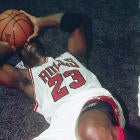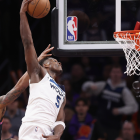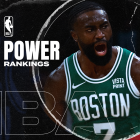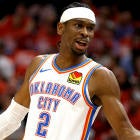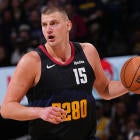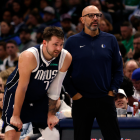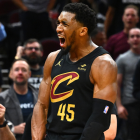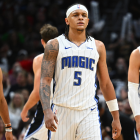We laughed. We cried. We made memes. On Sunday, the 10-part documentary, "The Last Dance," which covers Michael Jordan's career from start to finish, but focuses on his final championship season in 1997-98 with the Chicago Bulls, came to an end. There were countless memorable images and sequences in the film, a testament to both the original footage and the interviews the filmmakers obtained.
With the story officially concluded, however, let's take a look back at the moments that stood out the most. Everyone will have their own parts that resonate with them the most, but this is a pretty good cross-section of the most entertaining highlights of one of the most-watched sports documentaries of all time.
12. Legendary 'Space Jam' pickup games
Jordan launched his NBA comeback late in the 1994-95 season, but his Bulls lost to the Orlando Magic in the Eastern Conference semifinals. Over the summer, Jordan knew he needed to get back into basketball shape after a detour into professional baseball, but he was scheduled to film "Space Jam" for several weeks. So what did he do? He had the producers build him a full scale basketball court and weight training facility on set, and he invited some of the game's best players like Juwan Howard and Reggie Miller to compete with him night in and night out. In the documentary, several witnesses talk about how intense and entertaining those games were, and remarked about how Jordan was able to work out and play for multiple hours after a full day of filming.
Michael Jordan playing a pick-up game on the SpaceJam set at The Jordan Dome aka The Bubble.
— Ballislife.com (@Ballislife) May 11, 2020
Each night from 7:30-10PM, MJ & up to 22 NBA players would play there. #TheLastDance
pic.twitter.com/RVf7LNfRcS
The documentary also reveals that, in typical Jordan fashion, he used the games to scout and evaluate the tendencies of his opponents to help give him an edge in the upcoming season.
11. Jordan calls out Horace Grant for snitching
The drama and strife within the Bulls presented in the 1992 Sam Smith book, The Jordan Rules, rubbed Jordan the wrong way, particularly since it contained anonymous information from members of the organization. During the documentary, Jordan confidently identified teammate Horace Grant as the informant, which Grant vehemently denied despite admitting to a good relationship with Smith.
Michael Jordan says Horace Grant was the "Jordan Rules" player leak. Horace Grant denies pic.twitter.com/usFS7MVxQu
— Rob Lopez (@r0bato) May 4, 2020
Considering we heard Jordan straight-up invent a story about LaBradford Smith trash-talking him, it's not too much of a stretch to think that Jordan got in his head that Grant provided Smith with sensitive information and never really followed up with fact-checking.
10. Jordan gives Gus the game ball
Particularly after the passing of his father, Jordan found a father figure in personal security guard Gus Lett. Despite battling lung cancer, Lett managed to be in attendance for the Bulls' Game 7 win over the Indiana Pacers in the 1998 Eastern Conference finals, a series Jordan said was his toughest in 13 years. Afterward, Jordan found Lett and delivered him the game ball, making for one of the most touching moments of the documentary.
"When my father got killed, he became like a father figure to me."
— NBA on ESPN (@ESPNNBA) May 18, 2020
The bond between MJ and Gus Lett was special ❤️ #TheLastDance pic.twitter.com/E05i5xXjMs
9. Black Jesus
Reggie Miller is one of the most prolific trash-talkers in the history of the NBA, but he may have met his match in Michael Jordan. In the penultimate episode of the documentary, Miller describes a game in which he significantly outscored Jordan in the first half. True to form, however, Jordan came out and destroyed Miller in the second half. Miller recounted the epic tagline Jordan put on the performance: "Don't ever talk trash to Black Jesus."
"Don't ever talk trash to Black Jesus" #TheLastDance pic.twitter.com/J56ULRAWrZ
— Outkick the Coverage (@Outkick) May 18, 2020
8. Harper wanted to guard M.J. on 'The Shot'
In a rare moment in the documentary when someone stole the spotlight from Jordan, Ron Harper delivered one of the most memorable lines of the series when discussing why Cavaliers guard Craig Ehlo was defending Michael Jordan during "The Shot," which eliminated the Cleveland from the 1989 playoffs. Harper, who would later team up with Jordan for three championships, recounted asking coach Lenny Wilkens to let him guard M.J. on the final possession. Wilkens told him Ehlo was going to guard Jordan and Harper's response was one of the funniest moments of the documentary, becoming an instant meme "Yeah OK, whatever. F--- this bulls---." (NSFW language in video)
Ron Harper was savage for this 😂 pic.twitter.com/6nUz4Qi9tx
— Jonathan Peterlin (@JPeterlin) April 27, 2020
For what it's worth, Harper was traded to the Los Angeles Clippers six months later.
7. Kobe calls Jordan his 'big brother'
Get the tissues ready. The entire sequence of the documentary about Kobe Bryant was emotional, but there was hardly a dry eye across the country when Bryant described his relationship with Jordan. There was a moment before the 1998 All-Star Game, Bryant's first, when Jordan criticized "that little Laker boy" for being selfish, but it clearly didn't prevent Jordan from offering his mentorship to the league's next great star.
ICYMI: Kobe says MJ was like a big brother 🐍🐐
— ESPN (@espn) May 4, 2020
"I don't get five championships here without him."#TheLastDancepic.twitter.com/RLcN0gmDrv
"What you get from me is from him," Bryant said. "I don't get five championships here without him, because he guided me so much and gave me so much great advice."
6. Stogie and a baseball bat
Knowing so much about Jordan both on and off the court, it's easy to forget just how cool he was. Early on in the documentary they showed Jordan's interview about his perceived gambling problem, and he does the whole thing wearing a pair of sunglasses indoors. The coolest image of the 10-part series, however, may have been when Jordan was sitting in his locker discussing the art of trash talk, all while puffing on a cigar and going through half-swings with a baseball bat. The smooth '90s R&B playing in the background makes this almost too perfect.
Michael Jordan swinging a bat in the Bulls locker room while smoking a cigar and dunking on his opponents is the most Michael Jordan thing ever#TheLastDance pic.twitter.com/jO1qNOcbCV
— Blue Wire Podcasts (@bluewirepods) May 11, 2020
5. Jordan's colorful words for Isiah Thomas
The rivalry between Jordan and Isiah Thomas is well-chronicled in the documentary, but the best moment comes when Jordan is offered a video of Thomas explaining why he and his Pistons teammates refused to shake the Bulls' hands after losing in the 1991 Eastern Conference finals. Jordan didn't even watch a second of the video before launching into a retort.
"I know it's all bulls---," Jordan said before he even looked at the tablet. "Whatever [Isiah] says now, you know it wasn't his true actions then. [He's had] time enough to think about it, or the reaction of the public that's changed his perspective. ... You can show me anything you want. There's no way you can convince me he wasn't an a--hole."
Jordan seems to operate under the same principle as the Jack Burns circle of trust: Once you're out, you're out -- there's no coming back.
4. Rodman's 48-hour Vegas vacation
Dennis Rodman is a unique individual, to say the least, and the documentary detailed the remarkable story of his 48-hour trip to Las Vegas in the middle of the 1997-98 season, which culminated in Jordan essentially dragging his starting power forward from his home to return to the team. Rodman was going a bit stir crazy during the season, so Jordan and head coach Phil Jackson agreed to allow him a two-day sojourn with no questions asked. Rodman miraculously made it home, but was late reporting back to the team, and his then-girlfriend Carmen Electra claims she was hiding in Rodman's home when Jordan came to get him. You just can't make this stuff up.
Rodman wanted to take a vacation … mid-season 😳
— ESPN (@espn) April 27, 2020
48 hours in Vegas #TheLastDance pic.twitter.com/JWGpnEqgJH
3. Jordan relentlessly insulting Scott Burrell
Before the documentary, some younger NBA fans probably weren't familiar with Scott Burrell. They certainly are now. Viewed by Jordan as a talented player and "nice guy" who lacked the passion and drive to maximize his skills, Burrell was constantly pushed through both physical and verbal means to the point of torment. During a two-minute span of footage, we see Jordan call Burrell everything from "dumbass" to "bitch" to "fathead motherf----," but perhaps the most biting barb came when Jordan looked at Burrell from the sidelines and said, "Hey, Scott Burrell, where your mouth at now, ho?"
“Where ya mouth at now, h*?”
— Ballislife.com (@Ballislife) May 11, 2020
2 minutes of MJ roasting & trying to piss off Scott Burrell in practice #TheLastDance
pic.twitter.com/nKLlOPeq7K
Jordan was infamously hard on his teammates, to the point of getting in physical altercations with a number of them, but this montage of him eviscerating Burrell let us see and hear it directly. For the record, Burrell averaged 13.7 minutes per game in the 1997-98 regular season, and 12.4 minutes in the playoffs. But he got a ring out of it, so maybe it was worth it?
2. Jordan laughs off 'The Glove'
Any time you see M.J. with a tablet in his hands, you know it's going to be good. No scene quite embodied Jordan's arrogance more than when he laughed uproariously through a clip of former Seattle SuperSonics guard Gary Payton, known as "The Glove" for his defensive prowess, talking about how he kept Jordan in check during the last few games of the 1996 Finals. By all accounts and numbers, Payton actually did stifle Jordan, and that's what makes this whole thing so great. In Jordan's mind, the very idea of Payton keeping him in check is literally laughable, and he caps it off with a perfect Jordanism: "I had no problem with The Glove."
Gary Payton thought he found a way to get to MJ ... Mike wasn't sweating the Glove 😂 #TheLastDance pic.twitter.com/Z8NG7qN5hW
— ESPN (@espn) May 11, 2020
If you were looking to capture the essence of Michael Jordan's on-court persona in a single image, this would be it:
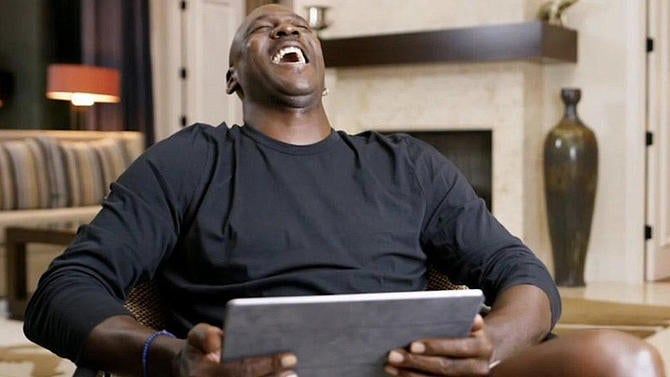
1. Jordan breaks down after Father's Day win
One thing many of us were looking for in this documentary was vulnerability from Jordan. We know the persona -- the competitiveness, the trash-talk, the greatness -- but behind that is a human being who has to deal with real life just like the rest of us. We didn't see much of it in "The Last Dance", but one sequence gave us a glimpse of Michael Jordan as opposed to Air Jordan. After winning the 1996 title over the Sonics on Father's Day, Jordan displayed the conflicting emotions of his first title since the death of his father by uncontrollably sobbing on the locker room floor. You had probably seen the video before, but hearing the raw audio was truly heart-wrenching.
Hearing MJ cry on the floor after the Fathers Day championship win was probably the most emotional moment from #TheLastDance so far. pic.twitter.com/OnHdz1CHAq
— David Astramskas (@redapples) May 11, 2020
These are the type of real moments we love to see from our sports heroes. You can debate Jordan's leadership tactics and his penchant for holding unnecessary vendettas, but you can't deny that the man put every ounce of himself into the pursuit of excellence, and it all overflowed on that Father's Day evening in 1996.













